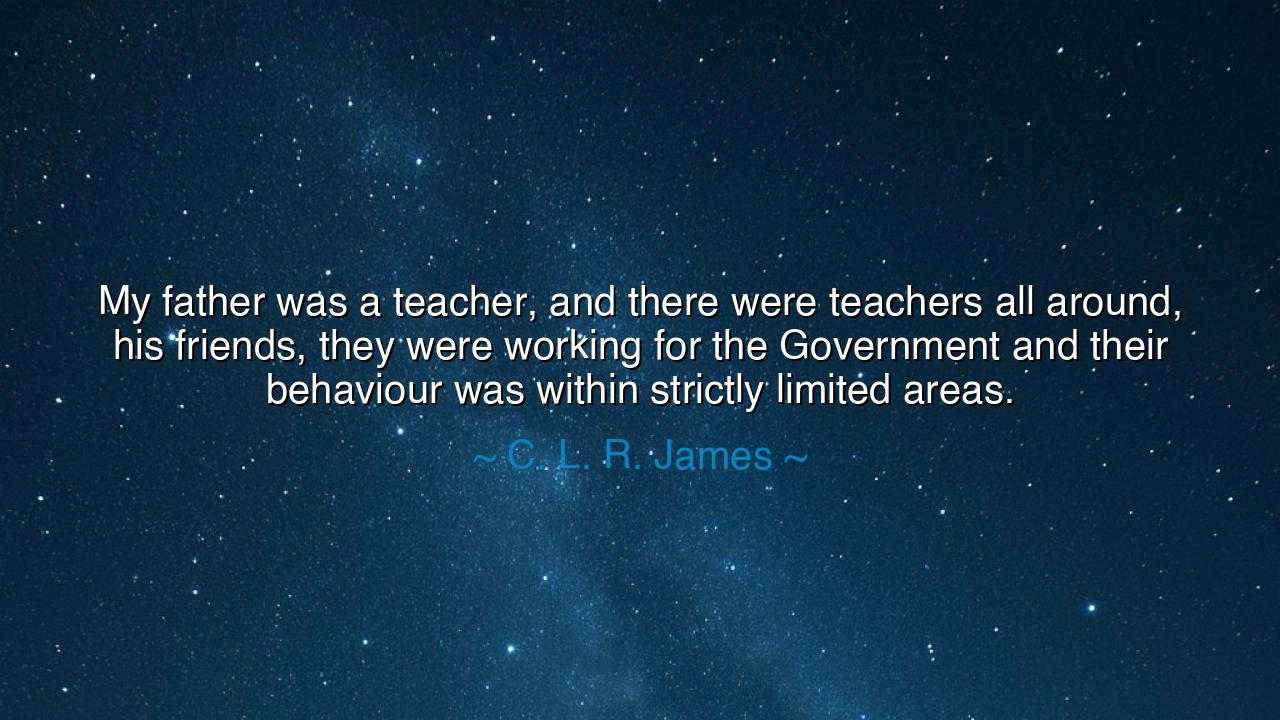
My father was a teacher, and there were teachers all around, his
My father was a teacher, and there were teachers all around, his friends, they were working for the Government and their behaviour was within strictly limited areas.






C. L. R. James, the historian, philosopher, and revolutionary, once reflected: “My father was a teacher, and there were teachers all around, his friends, they were working for the Government and their behaviour was within strictly limited areas.” These words, though spoken simply, are filled with layers of meaning. James is not merely describing his upbringing; he is exposing the nature of authority, of education, and of the subtle chains that bind men when they serve institutions rather than truth. The teacher, that noble figure who should awaken freedom in the minds of the young, is here portrayed as bound within “strictly limited areas,” his voice restrained by the expectations of the Government.
The ancients would recognize in this the conflict between freedom and order, between the spirit of inquiry and the weight of authority. A true teacher, in the deepest sense, is not one who repeats the decrees of rulers, but one who seeks wisdom, wherever it may be found. Yet James shows us how the teachers of his youth were shaped not by inner vision but by outer command, hemmed in by narrow expectations. Their behaviour was regulated, their speech confined, their teaching transformed into mere duty rather than a fire that liberates.
Consider the example of Socrates, who stood in Athens and dared to question what all others accepted. His city, proud and democratic, allowed teachers to flourish, yet when he pressed too deeply, when his questions threatened the order of the state, he was silenced with hemlock. Here we see again the tension James describes: the Government permits learning only so long as it remains within “limited areas.” True wisdom, true teaching, forever presses against these boundaries.
James himself would rise beyond those limits. Born in colonial Trinidad, he was surrounded by men and women who served as instruments of empire, enforcing the doctrines of the British Government in classrooms across the island. Yet he refused to be confined. His path led him to question colonialism, to celebrate the revolutions of enslaved peoples, and to proclaim the dignity of cultures long silenced. In this way, he rejected the model of the restrained teacher and became a liberator of minds, showing that education without freedom is but another form of servitude.
The meaning of his words, then, is both lament and challenge. He laments that the teachers of his youth, including his own father, were bound by rules that kept them from daring, from expanding, from awakening true freedom in their students. But he also challenges us to see what teaching should be: not the servant of Government, nor the mouthpiece of power, but the courageous voice that leads beyond the prescribed path. A teacher is great not when he stays within boundaries, but when he guides others to think beyond them.
The lesson for us today is clear. Authority will always seek to confine, to dictate what can and cannot be spoken, to define the “limited areas” in which teachers may act. But those who would be true educators must carry a higher allegiance — not to power, but to truth, to freedom, to the flourishing of the human soul. Whether you are a parent, a mentor, or a leader, you must ask: am I repeating what is safe, or am I awakening what is real?
Practically, this means daring to ask difficult questions. It means encouraging the young not only to memorize, but to challenge, to reason, to imagine. It means recognizing that while Government may provide structure, it must never dictate the limits of thought. Seek teachers who are not content with obedience, but who inspire independence. And if you yourself are called to teach, let your words and actions carry the courage of James: do not confine yourself to the narrow areas allotted by authority, but reach outward to the wide horizon of truth.
Thus, C. L. R. James’s reflection endures as a warning and a call. “Their behaviour was within strictly limited areas.” May we not fall into the same pattern. Let us honor the teachers who break beyond the limits, who defy the chains of mere duty, and who, like James himself, light the fire of freedom in every mind they touch. For only in such teaching does education fulfill its highest calling — not the service of power, but the liberation of humanity.






AAdministratorAdministrator
Welcome, honored guests. Please leave a comment, we will respond soon